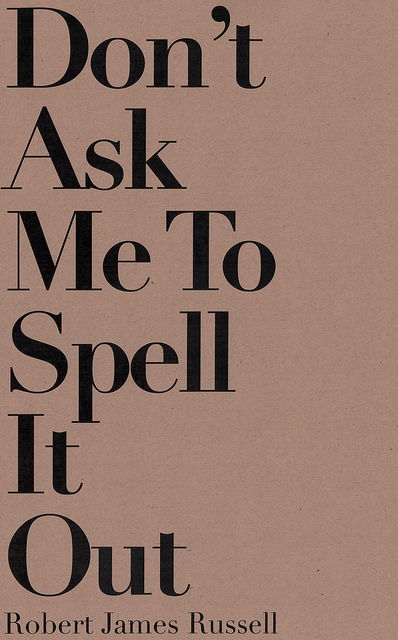 DON’T ASK ME TO SPELL IT OUT: STORIES
DON’T ASK ME TO SPELL IT OUT: STORIES
March 2015
WhiskeyPaper Press
Paperback | 40 pages
$12
Print: WhiskeyPaper Press
A great storm and its effect on a young family; a woman with a rifle in a barren landscape; boys discovering the world of possibility in online sexuality; a couple at a scenic overlook, their relationship at the verge of dissolution. Each story in Don’t Ask Me to Spell It Out is a sliver of time pulled from the life of a young man, each a fragment of feeling, each a pivotal intersection of relationships. They are stories about the desperation of trying to fit in and find a kindred, to understand the elusive essence of love in all forms, to fill a void of solitude that only seems to grow as we do. They navigate the mysteries of relationships between men and women, of family and geography, and find a recurring theme of abject longing throughout.
Background on the story “Frans”
Background on stories “Doing the Thing” and “Claude”
ADVANCE PRAISE
Robert James Russell’s voice is full of the Midwest, full of the odd mix of modesty and boastfulness, the hard rough luck and unlikely grace that characterizes this part of the country. His young narrators, unsure of themselves and their place in the world, help us navigate through our own uncertainty. —Amber Sparks, author of May We Shed These Human Bodies
Don’t Ask Me to Spell It Out takes flight in the jagged chasm between who we are and who we want to be, starkly illustrating how we love, and lose, only to re-build ourselves again. —Ben Tanzer, author of Orphans and Lost in Space
In this sharp, deft collection of stories, Robert James Russell describes moments and encounters so seemingly everyday that it’s almost too late when we notice—amid their quiet claustrophobia—the lines of tripwire. His narrators take the backward view in order to see ahead, feeling along the edges of relationships and memories to make sense of where these young men must go next, go now. Everywhere is the melancholy of past loves, near-loves, and no love—beauty in the most aching sense. —Adam Schuitema, author of the collection Freshwater Boys and the forthcoming novel Haymaker
Simply put, they don’t make them like Robert James Russell anymore. Witness here the craft of a master. Crisp, fine-tuned stories that milk every bit of meaning and power out of the words while still managing to touch and move the reader. We’re lucky to have him, so consume these works greedily and then do it all over again. —Jared Yates Sexton, author of An End to All Things
Robert James Russell’s Don’t Ask Me to Spell It Out is a smart, beautiful collection of longing, restlessness, and ache. From the first page, where we learn his young narrator would “only eat the fried chicken skins peeled from nuggets” Russell’s keen eye for detail that is at once startling and revelatory is on display. With quiet precision and remarkable restraint, he offers his readers glimpses into the emotional lives of his characters: sons, neighbors, cousins, adolescent friends, young lovers. Throughout, his instincts are just so good. Like the collection’s title, Russell exhibits a deep understanding of the incredible power in what’s unsaid. —Sara Lippmann, author of Doll Palace
These stories made me nostalgic… nostalgic for places I haven’t been, for people I’m glad are in my past, for cousins I never had, for a younger self that, at the time, I never could have believed I’d be nostalgic for. The characters throughout Don’t Ask Me are struggling…to relate to one another, to express themselves, to decipher what one another means, in both what is said and isn’t. Their relationships are over but they haven’t admitted it yet, or they’ve admitted it but they aren’t actually over, or they aren’t sure that what they’re in is even a relationship or not. They’re trying to figure things out and I was sucked in, equal parts trying to help guide them while also struggling to figure something out about myself. —Aaron Burch, author of Backswing
Filled with the threat of love and violence, Robert James Russell’s stories work like a connect-the-dots of memory, capturing the moments that lead us into adulthood, selfhood, identity. These coming-of-age snippets—like short films of a spliced together life—capture the essential anecdotes in the lives of their narrators: how they learn desire; how they learn loss. —Gerry LaFemina, author of Wish List and Clamor
REVIEWS
“Russell’s collection especially shines when focusing on the details and particularities of the narrators.” —Brett Beach, Heavy Feather Review
